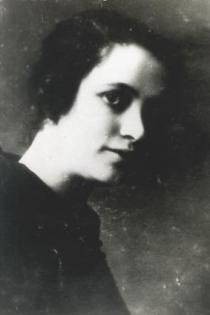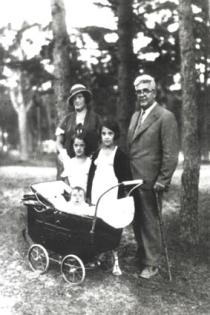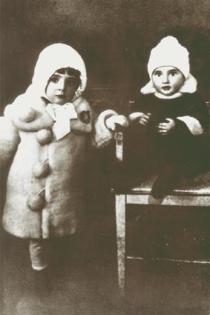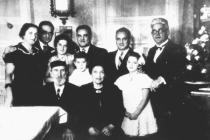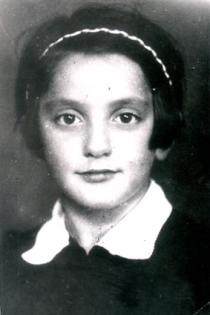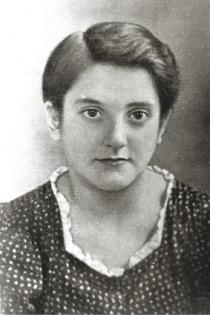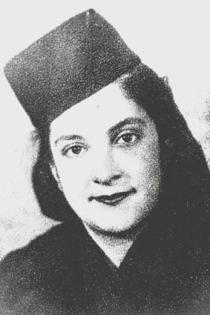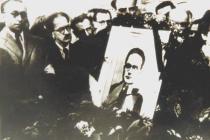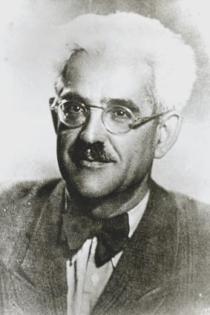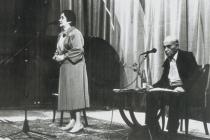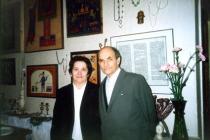This photograph was taken in Moscow in 1970s. Here I am telling the audience about Vilnius ghetto.
On September 6, 1941 fascists enclosed several narrow streets in the city center and moved all inhabitants away. Jews were forced to move to their houses. That was the way Vilnius ghetto appeared. Our family also moved there. We lived penned up together with other families: 18 persons in a small room. There was not enough place to sleep. A girl slept on the table, another one slept under the table. There was a girl who had to sleep in the bath. Mom started working at a sewing workshop. We were given ration cards and received only 125 grammes of bread and some black peas per day. It was forbidden to bring food into the ghetto. If somebody did, it could cost him his head.
In the ghetto fascists often carried out special actions: i.e. taking people for executions. In autumn of 1941 those actions were the most mass ones: 3-5 thousand people were executed during every action. And later when only the necessary number of handicraftsmen remained in the ghetto, they started terrifying people by unexpected searches. Soldiers rushed into any apartment and arranged a search. They did their best to find clothes without the yellow star, bread baked differently (in the ghetto they made special bread that looked like clay). If they found it, they immediately took all inhabitants of the apartment away. Certainly nobody ever saw them again.
Some news from the front line seldom reached us. With great pleasure we got to know that Germans ran away from Moscow and already left Kalinin [a city near Moscow, now Tver]. The German army suffered heavy losses and its soldiers suffered from frost very much. Therefore hitlerites decided to dress warmly at our expense: they ordered us to bring to the commandant's office all fur coats, fur collars and fur cuffs. And again death penalty was promised for those who refused.
The ghetto was some sort of a small state. In the ghetto there were different offices responsible for distribution of ration cards and rooms (or rather corners in the rooms). There was a special department taking care of orphans (several boarding schools were organized). There were schools and even a grammar school for children, but it was half empty: not because there were no children, but because they all had to work. There were a prison, a hospital, a drugstore with a poor set of medicines. In the ghetto there was even an underground organization which fought against fascism. One day 3 activists of that organization I. Kaplan, A. Khvoynik and A. Big got to know about liquidation of the ghetto and decided to leave for the forest through a drain-pipe. But unfortunately they lost their way underground and got out in the city center. Soldiers seized them and hang. When my book was ready for the first publication, the editor said 'People you named were not listed as partisans, eliminate this episode.' - 'But they were the organization members' I insisted. But nothing could move him 'Tomorrow they will come to ask for a special pension!' - 'Do not worry, they will not come: fascists hang them' I calmed him. But at that time I could not think about the future book and even about my possible survival.
Persecutions of fascists knew no limit. One day they took all old men away from the ghetto. They said they wanted to bring them to a recreation house to feed and treat. Relatives became suspicious and refused to let them go. But old people were taken away by force. They were really fed well and photographed during the first 2 days. And then they all were executed by shooting.
In the spring I found a job. For the most part we worked outside the ghetto. At first I worked on the fields of an old rich person. I had to carry hundred buckets of water a day to water plants. Later I started working at a knitting workshop, where women added fingers to gloves by knitting. Later I went to a furniture factory to polish skis.
That was they way we lived in the ghetto: dying from starvation and cold, and waiting for death. It seems strange, but in the ghetto there was a chorus. I was its member. We sang in Hebrew and in Yiddish. The head of the chorus also created a symphonic orchestra and they prepared the Beethoven's Ninth symphony for performance.

